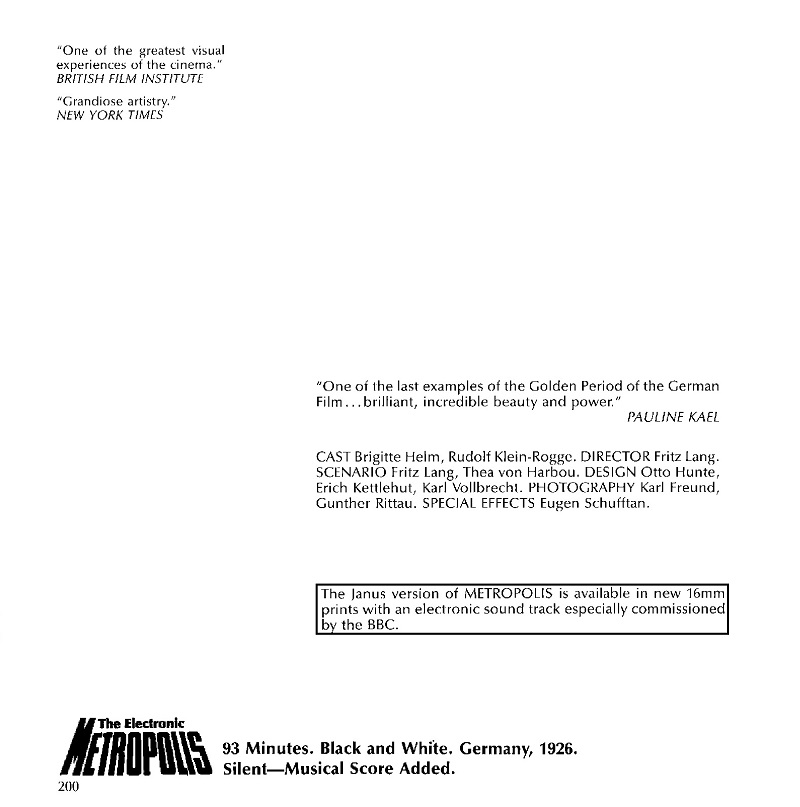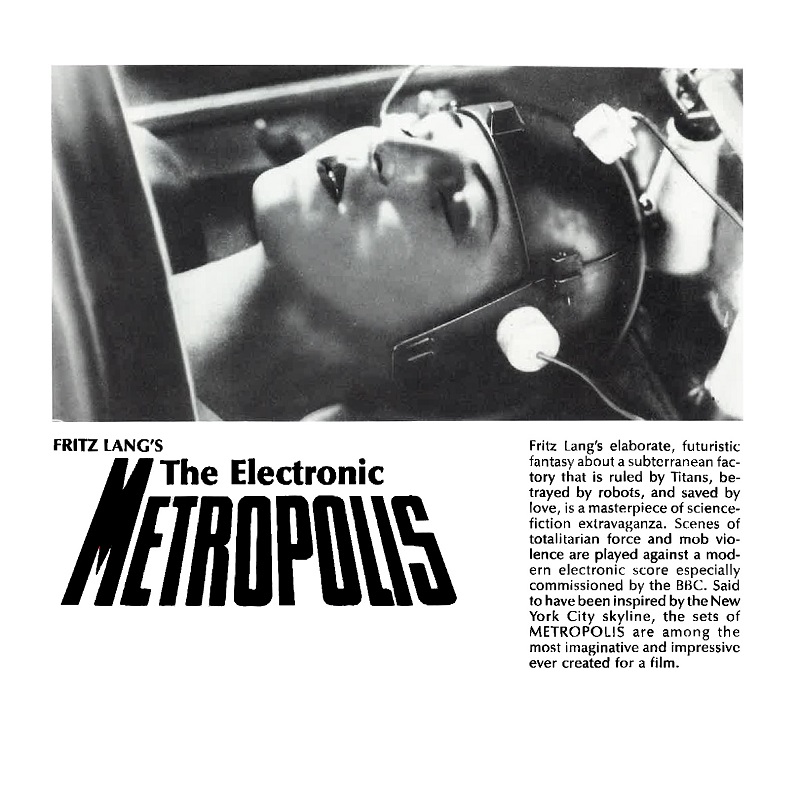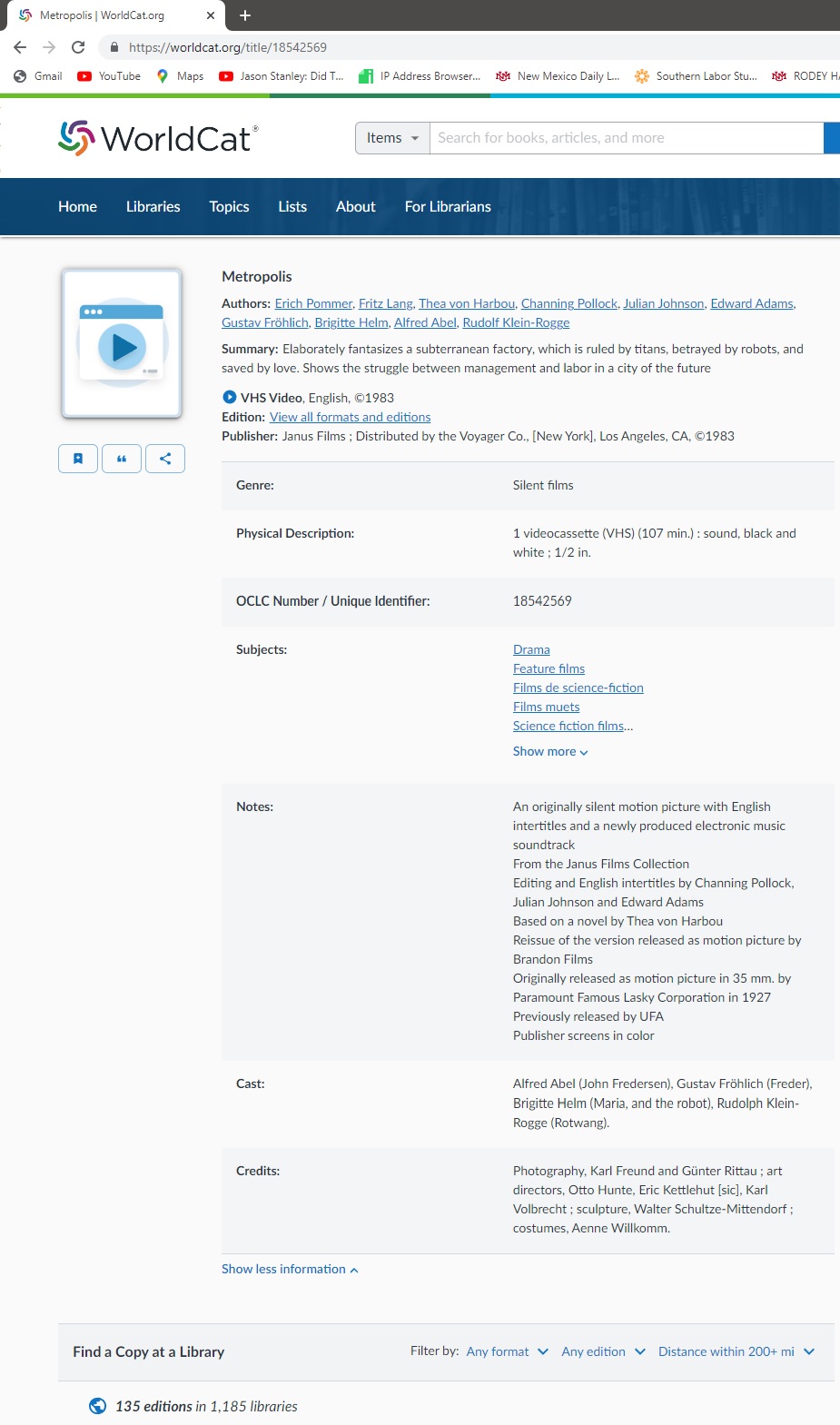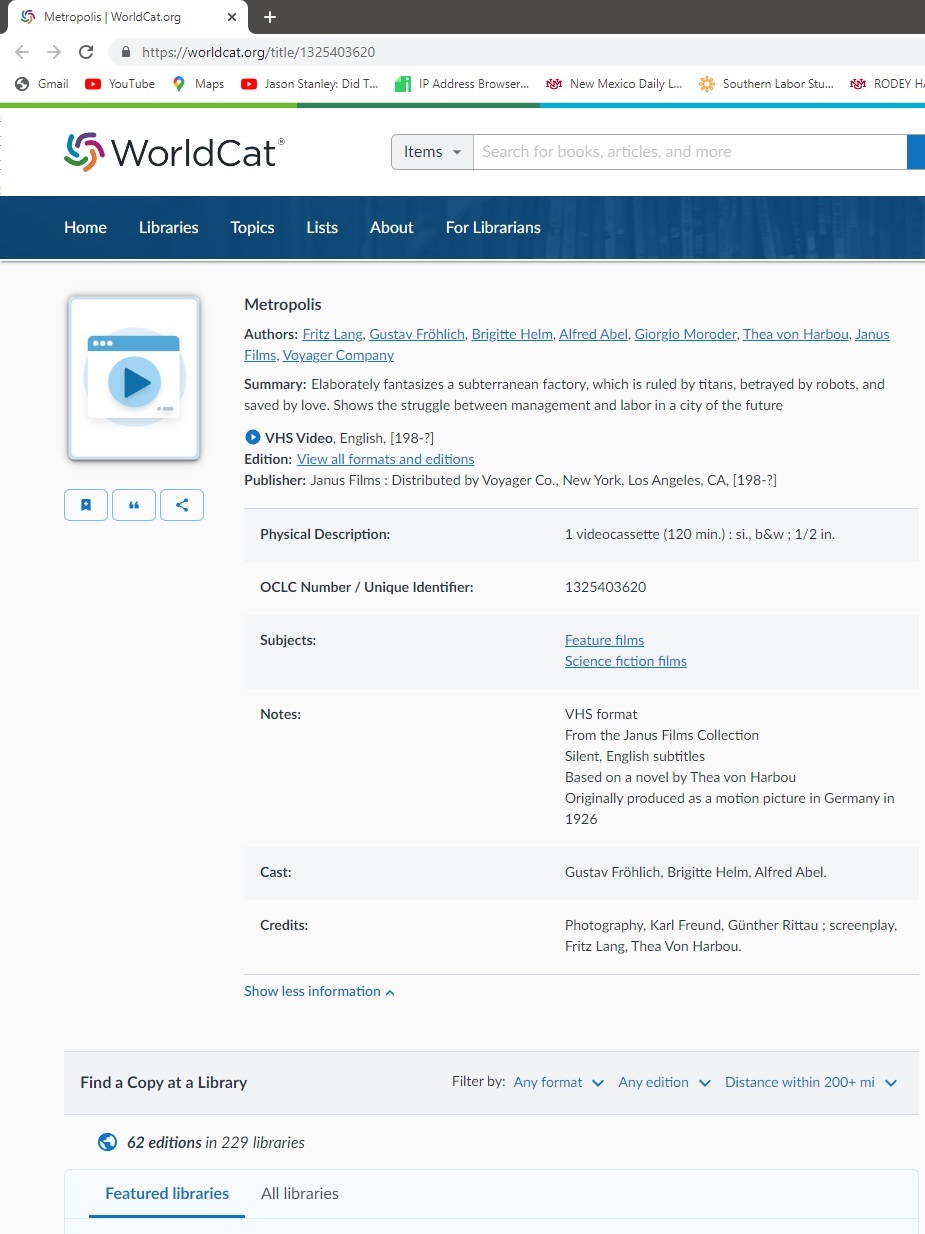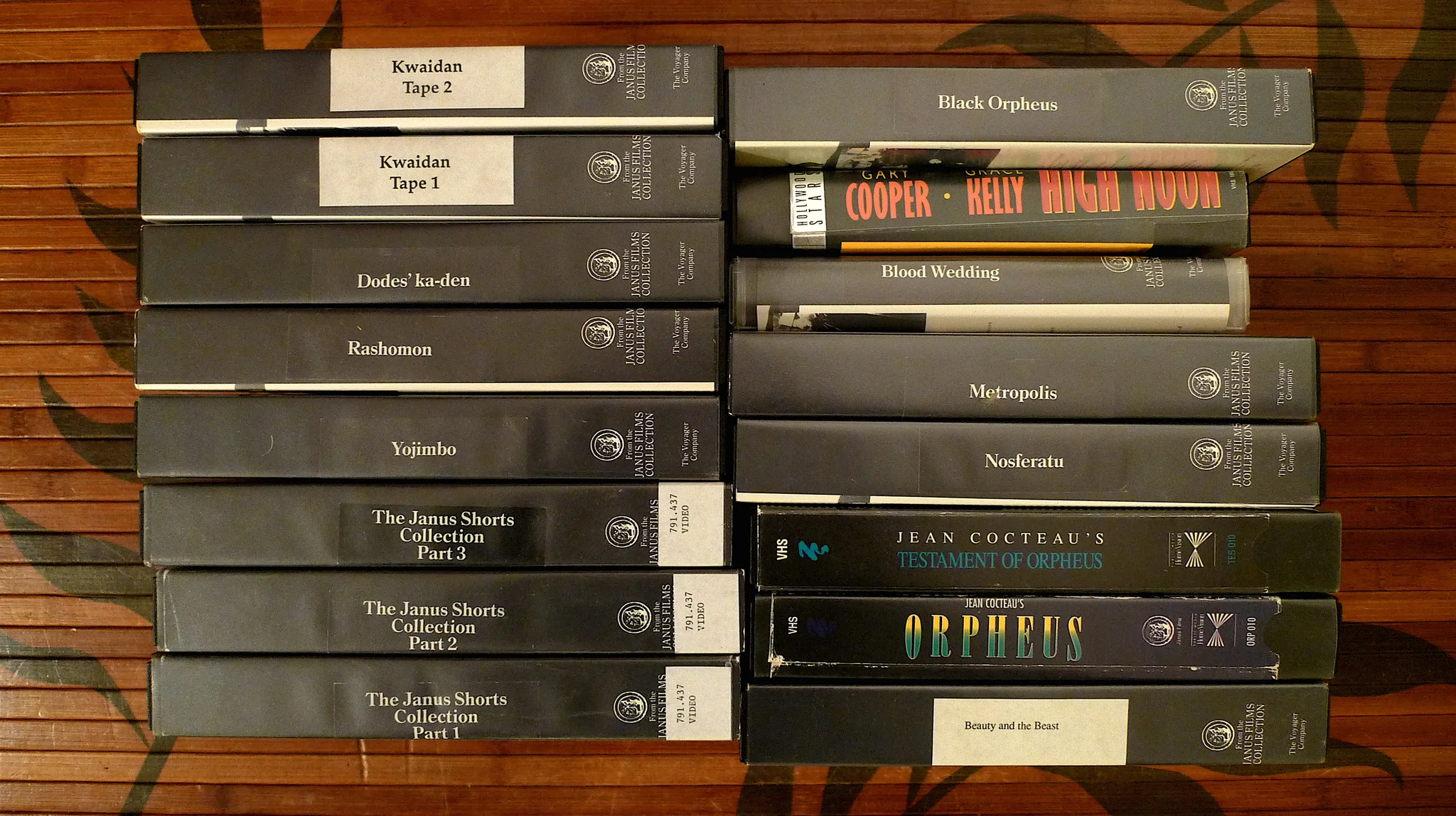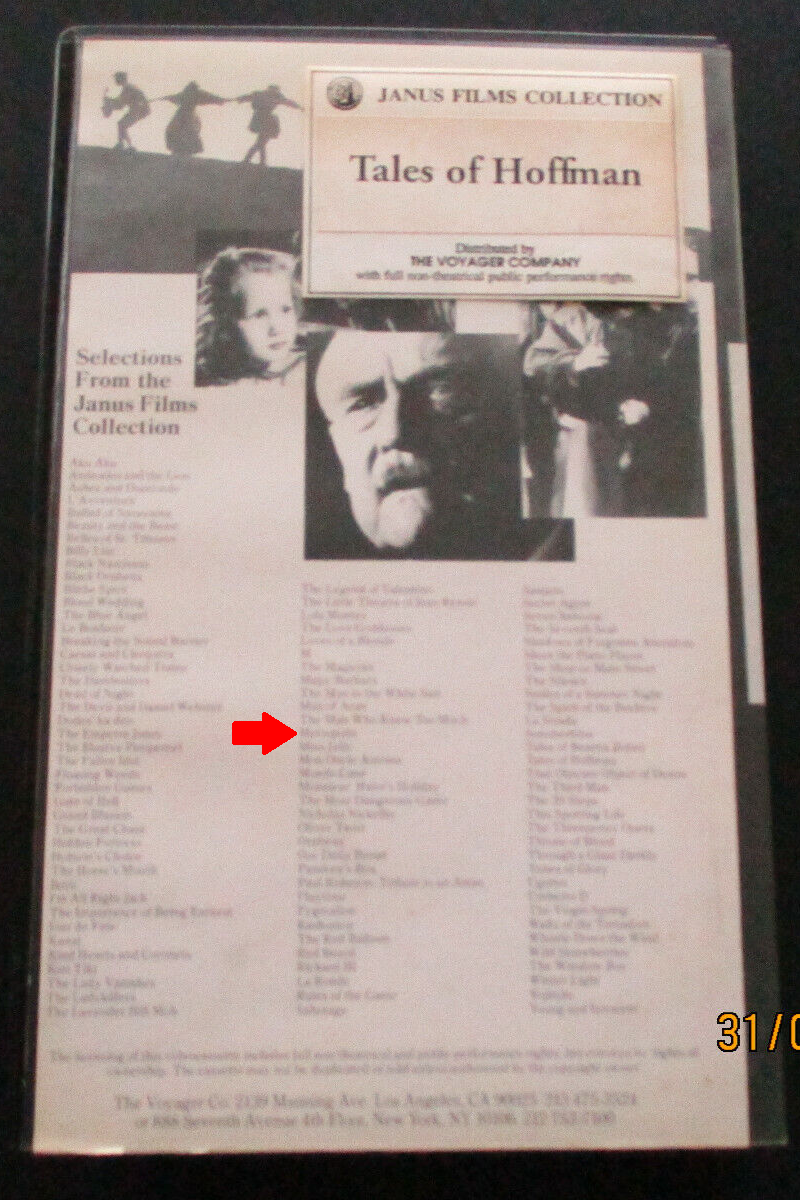| Return home | 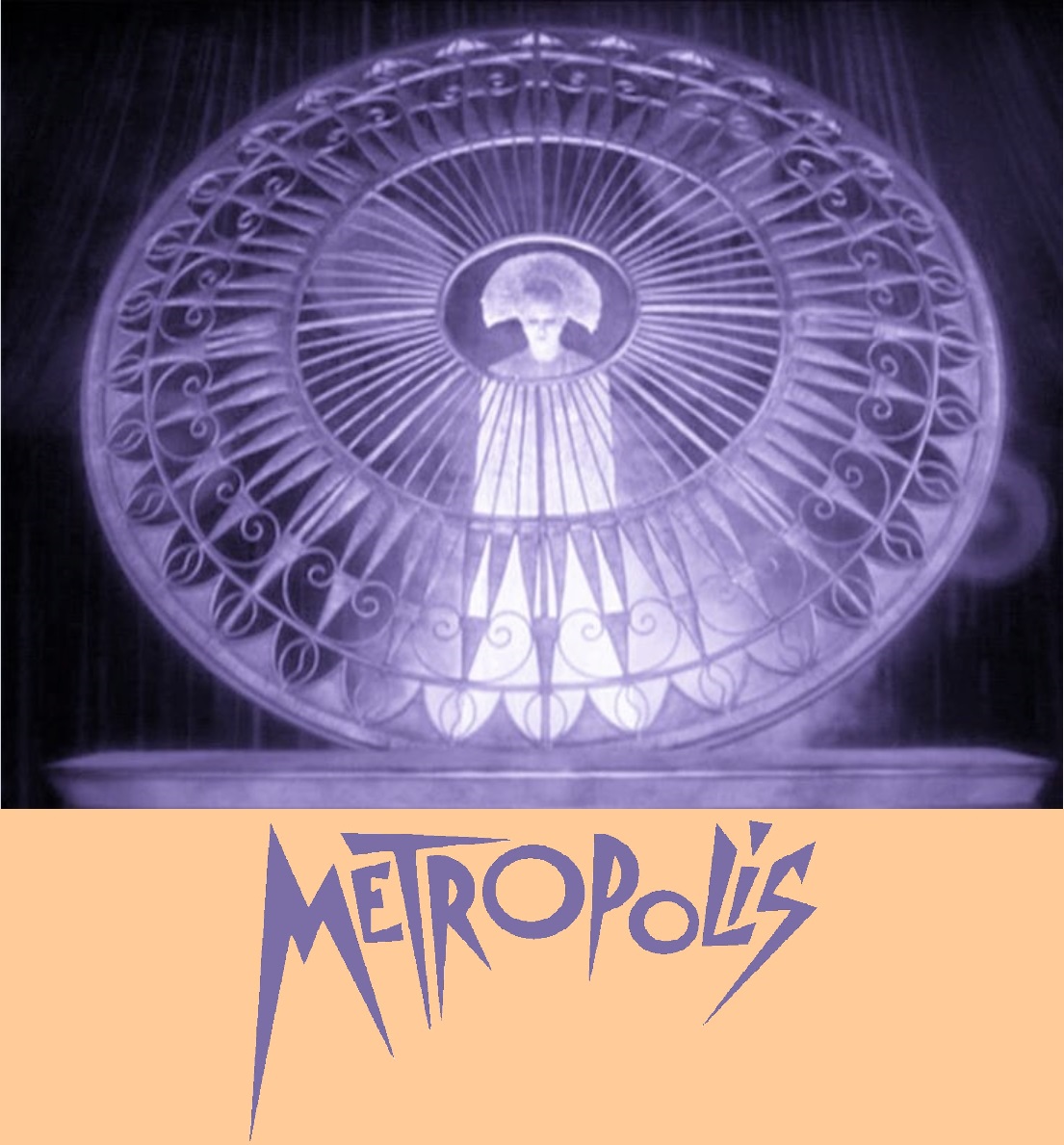 |
Return to previous page |
|
1983: The Electronic Metropolis
|
|
Let’s get back to Ted.
To fill in the final three minutes of his
|
|
But I did find out who owns the BBC version - Janus Films.
I will explain.
I recorded the BBC version in 1978 off KCET in los angeles.
After that it was never shown again.
However I erased over by mistake the last 5 min.
Then in the 1980’s Metropolis was shown on Bravo & it was the BBC version but speeded up & bad quality.
So I was able to rerecord the missing 5 min.
As soon as they shake hands it cut away & said:
Brandon films & then Janus films.
Janus degraded the beautiful BBC version & trashed it. & suppressed it.
Guess I was lucky to record it the first time!
|
|
|

|
|
Why? Because telecine operators and film-to-video technicians and projectionists
(and lab technicians and cinematographers and movie directors and movie producers and film historians)
all have this idea that “Silent movies were 1:1.33” and
“Old sound movies were 1:1.33”
and conclude that “They’re the same!
|
|
Just now, I made a discovery, and it knocked the wind out of me.
Since I started scribbling this Metropolis essay at about the beginning of 2023,
I have begun collecting various video editions of the movie, as well as whatever Janus Films catalogues I can find on eBay.
I just received the 1984 catalogue, THE CLASSIC COLLECTION:
A joint distribution venture of Janus Films and Films Incorporated, Third Edition.
Inside is a listing for The Electronic Metropolis.
Behold:
|
|
We see that Brandon Films sublicensed this edition to Janus Films and Films, Inc.
Or was it Janus Films that sublicensed this edition to Brandon Films and Films, Inc.?
The 126-minute audio would play properly at 20fps, but what 16mm projector can run at 20fps?
So it was played at 24fps, always, everywhere.
|
|
The Janus/FI catalogue supplies a running time of (approximately) 93 minutes, but that was for the previous Associated British edition,
which had been surrendered by this time.
The Electronic Metropolis was about 105 minutes at 24fps.
Oh my, what a mess!
You want to know why?
I’ll tell you why, because I’ve lived through this narrative countless times.
The boss, who has never seen a single movie in the Janus catalogue and who never will,
orders a grunt, “Get me a running time on Metropolis.”
The grunt pulls out an old 35mm print that is about to be returned to the license holder,
and he knows enough from experience to guesstimate and report back,
“About 93 minutes.”
And that’s what goes into the catalogue.
Nobody bothers to check the new edition against the old edition.
If somebody does mention to the boss that “The new edition is eleven minutes longer than the old edition,”
the boss will have one of two reactions, either, “Clear out your desk and get out of here,”
or, “Who cares?”
|
|
No matter where you work, the most surefire way of getting canned
is to hold a sincere commitment to the company’s mission statement.
That’s a terminable offense.
|
|
The catalogue, by the way, is
|
|
Ted made yet another discovery:
The Jahnke/Fitzwater/Davies edition of Metropolis had been issued on VHS after all!
Alas, it was not so simple.
This was not a VHS cassette that you could purchase from your neighborhood video shop.
There was a problem, a huge, huge problem.
Anyway, he helpfully referred us to a pair of OCLC listings as they appear on WorldCat:
|
|
|
|
The running time is approximate and was less than 107 minutes and certainly less than 120 minutes.
It had to have been 105 minutes plus some extra time for logos and copyright notices and the FBI warning.
|
|
Now, do you see a teensy problemette with those OCLC listings?
They list 1,185 + 229 libraries that have some sort of video of Metropolis,
but those listings include all 135 + 62 editions,
but how do we find the Voyager edition?
Needle in a haystack.
Well, a librarian just taught me a trick.
Then, when I got home, I accidentally discovered another trick.
|
|
OCLC item # 18542569: UCI University of California at Irvine, Multimedia Resources Center (MRC), Irvine, CA 92623,
|
|
OCLC item # 18542569: Manhattanville College Library, 2900 Purchase St, Purchase, NY 10577,
|
|
OCLC item # 1325403620: Enoch Pratt Free Library, 400 Cathedral St, Baltimore, MD 21201,
|
|
Just found two images on eBay that are of some interest.
Let’s look first at a front cover:
|
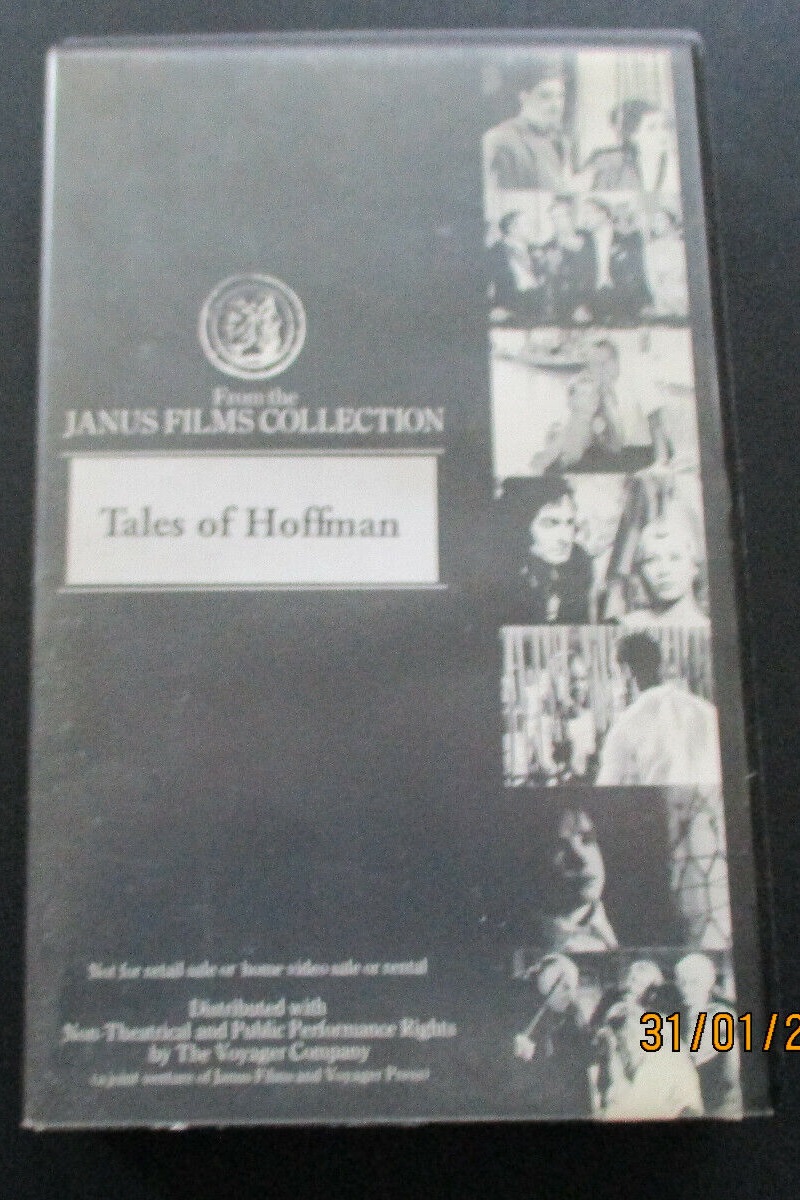
|
|
Yes, this is what the hard-black-plastic Voyager VHS shells all looked like,
with that plain black background and images along the right side.
They were bigger than what you would expect, with lots of extra room on the inside.
|
|
Do you see what I see?
It should be screaming at you.
Let’s enlarge a detail:
|
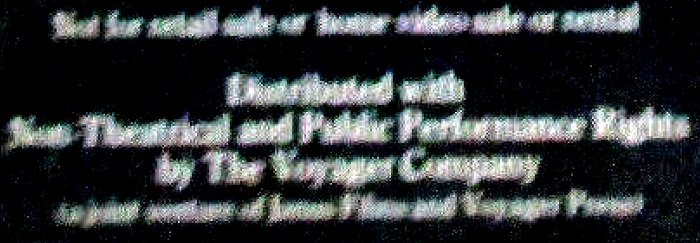
|
|
That’s blurry. Let me type it out for you:
|
|
Not for retail sale or home video sale or rental
Distributed with Non-Theatrical and Public Performance Rights by The Voyager Company a joint venture of Janus Films and Voyager Press |
|
Now isn’t that interesting?
No wonder I so seldom ran across these Voyager Company VHS tapes!
It’s going to be almost impossible to find one of these.
|
|
Now, there was a fellow who called himself festofspirit
who, in 2013, put up an auction of his
“JANUS FILM COLLECTION - with PUBLIC PERFORMANCE RIGHTS:
|
|
JANUS FILMS WITH NON-THEATRICAL RIGHTS - 16 VHS VOLUMES containing 31 FILMS
These VHS videos are from my personal collection and they come with Non-Theatrical Public Performance Rights for public exhibition in non-theatrical venues -- meaning they can be shown in a club, library, museum, gallery, restaurant, bar, etc. The videos are in FINE condition and almost all of the VHS (NTSC) tapes come in elegant hard shell cases. 16 VHS Videos containing 31 Films, including the three volume Janus Shorts Collection. These originally sold for $700 as a set.
F.W. Murnau’s NOSFERATU
Fritz Lang’s METROPOLIS Masaki Kobayashi’s KWAIDAN (on 2 Videos) Fred Zimmerman’s HIGH NOON Akira Kurosawa’s DODES’KA-DEN Akira Kurosawa’s YOJIMBO Akira Kurosawa’s RASHOMON Carlos Saura’s BLOOD WEDDING Marcel Camus’ BLACK ORPHEUS Jean Cocteau’s BEAUTY AND THE BEAST Jean Cocteau’s ORPHEUS Jean Cocteau’s TESTAMENT OF ORPHEUS PLUS THE JANUS SHORTS COLLECTION VOLS. 1, 2, & 3
This three volume collection of nineteen short, groundbreaking films are between 6 minutes to 55 minutes in length
and have collectively won almost every short film award in the world.
Many of these incredible short films have never been released elsewhere on VHS or DVD,
including THE BESPOKE OVECOAT by Jack Clayton, Godfrey & Lerner’s
DO IT YOURSELF CARTOON KIT,
Jan Lenica’s LABYRINTH, Walerian Borowczyk’s RENAISSANCE and
LES JEUX DES ANGES,
Wendy Toye’s THE STRANGER LEFT NO CARD,
Lutkovy’s haunting anti-war film THE MAGICIAN
and many more (see list below).
Three VHS (NTSC) videos in elegant hard shell cases:
Jack Clayton’s THE BESPOKE OVECOAT
Godfrey & Lerner’s DO IT YOURSELF CARTOON KIT Jan Lenica’s LABYRINTH Walerian Borowczyk’s RENAISSANCE and LES JEUX DES ANGES Wendy Toye’s THE STRANGER LEFT NO CARD Lutkovy’s THE MAGICIAN Polansky’s THE FAT & THE LEAN and TWO MEN AND A WARDROBE De Daunant’s CORRIDA INTERDITE Cocteau’s BLOOD OF A POET Bunuel’s UN CHIEN ANDALOU Reiniger’s PAPAGENO Vukotić’s ERSATZ THE FLY ENTER HAMLET Tadeusz Wilkosz’s BAGS Bettiol’s ACT WITHOUT WORDS Sechan’s THE STRINGBEAN Chris Marker’s LA JETEE SHIPPNG BY USPS MEDIA MAIL WITH DELIVERY CONFIRMATION
ABOUT ME: Lover of fine quality audio/video for three decades.
Moving overseas in the spring, so I am selling almost all of my collection.
|
|
Let’s get a close-up view:
|
